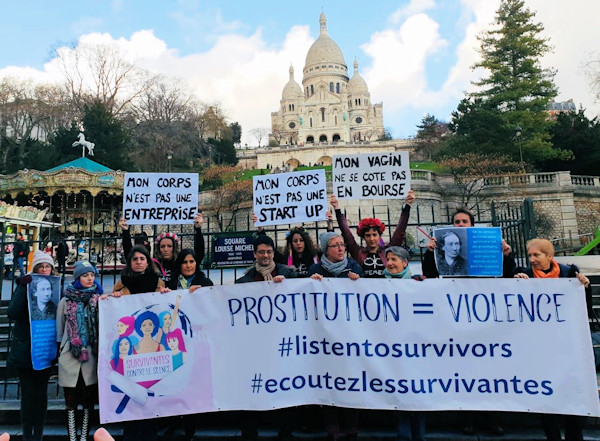In a historic decision, the Conseil Constitutionnel (French Supreme Court) has definitely validated this morning the constitutionality of the French 2016 Act introducing the criminalisation of the purchase of sex, the full decriminalisation of prostituted persons, and the creation of a nation-wide public exit, protection and assistance policy for victims of prostitution, pimping, procuring and trafficking.
The 2016 Act aimed at strengthening the struggle against the prostitutional system and providing support for prostituted persons was adopted on the 13th of April 2016 by a broad cross-party majority of the French Parliament, after 6 years of parliamentary investigations and discussions.
In close coordination with 69 NGOs fighting all forms of sexual and sexist violence, including its two French member organisations Fondation Scelles and Mouvement du Nid, CAP international has filed several written and oral voluntary observations to the Conseil Constitutionnel (see below).
CAP international has also greatly contributed to the mobilisation of a broad coalition of actors in support of the law. Six former Ministers[1] for women’s rights, 30 renowned doctors[2], a coalition of men opposed to the purchase of sex[3] have released open letters and op-eds urging the Conseil constitutionnel to maintain the criminalisation of the purchase of sex.
Finally, CAP international has also released the results of a historic survey showing that :
- 78% of FR people support the 2016 Act
- 83% of FR people believe prostituted persons are victims of criminal networks and have not freely chosen their activity
- 74% of FR people think prostitution is a violence
- 77% of FR people think that paying for sex amounts to impose a sex act by a financial constraint

Summary of CAP international voluntary observations submitted to the Conseil Constitutionnel.
Among many other arguments, CAP international has drawn the attention of the Conseil Constitutionnel on the fact that the French Parliament had solemnly recognised that the purchase of sex was, in itself, a form of sexual violence, an obstacle to equality between women and men, a violation of the principle of non-commodification of the human body, a violation of human dignity and the main driving factor of trafficking in human beings for sexual exploitation.
We have also highlighted that the economically ultra-liberal ideology of the pro “sex work” movement, attacking the criminalisation of sex buyers in the name of “freedom of entrepreneurship”, would automatically lead to a situation where pimping, procuring and running of a brothel would be decriminalised and where trafficking in women for sexual exploitation would explode. We have also denounced their attempt to introduce a legal distinction between a theoretic “free” prostitution (called “sex work”) and a “forced” prostitution (called human trafficking). The contemporary European experience indeed shows that the very small minority of European States (Germany and The Netherlands) having introduced this ideological distinction in the name of the “recognition of sex work” all ended up decriminalising pimping, procuring and the running of a brothel while claiming they would focus their efforts on fighting trafficking in human beings. Trafficking in human beings for sexual exploitations however, and very logically, dramatically increased in these countries after the legalisation of the sexual exploitation markets.
Contact: Grégoire Théry, executive director, +32 496 21 64 66
[1] http://www.leparisien.fr/faits-divers/prostitution-monsieur-le-premier-ministre-protegeons-notre-modele-abolitionniste-13-01-2019-7987608.php [2] https://www.lemonde.fr/idees/article/2019/01/09/loi-sur-la-prostitution-depenaliser-serait-une-catastrophe_5406832_3232.html [3] https://www.lejdd.fr/Societe/prostitution-lappel-au-conseil-constitutionnel-a-ne-pas-revenir-sur-la-penalisation-des-clients-3841709
